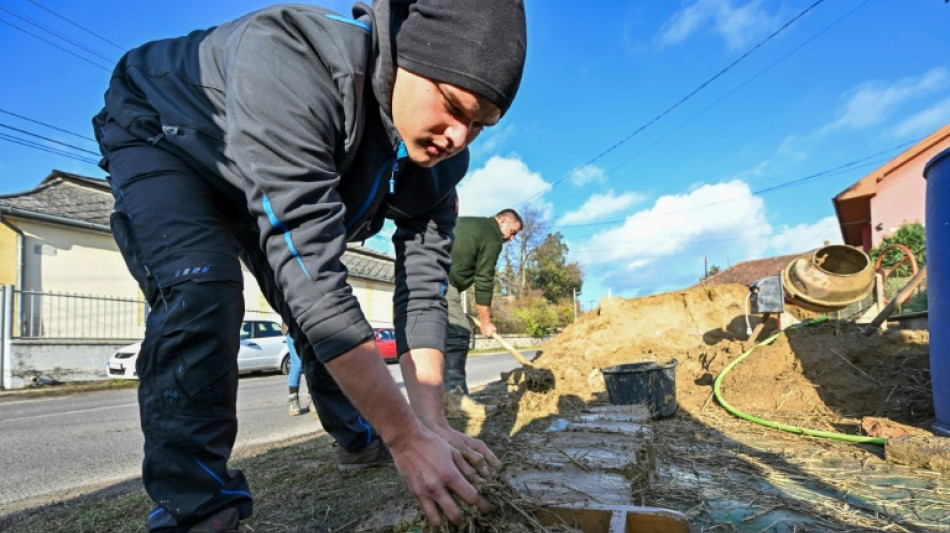
-
 Chinese rookie Wang grabs LPGA lead at storm-hit TPC Boston
Chinese rookie Wang grabs LPGA lead at storm-hit TPC Boston
-
US appeals court finds Trump's global tariffs illegal

-
 Sounders out to 'prove a point' against Messi's Inter in Leagues Cup final
Sounders out to 'prove a point' against Messi's Inter in Leagues Cup final
-
'Trans' neo-Nazi shakes up gender debate in Germany
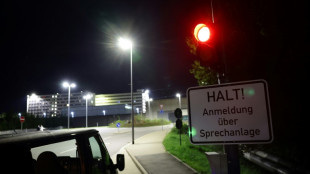
-
 Tiafoe bounced out in US Open third round
Tiafoe bounced out in US Open third round
-
Argentina police carry out raids in
Milei sister graft probe

-
 Maresca won't ban Chelsea players from social media
Maresca won't ban Chelsea players from social media
-
US Spirit Airlines files for bankruptcy again

-
 Amorim expects to stay at Man Utd as pressure mounts
Amorim expects to stay at Man Utd as pressure mounts
-
Alcaraz romps into US Open fourth round, injured Shelton exits

-
 Mussolini's great grandson hails winning Serie A debut with table-toppers Cremonese
Mussolini's great grandson hails winning Serie A debut with table-toppers Cremonese
-
Shelton quits US Open with shoulder injury

-
 In whirlwind tour, Qatari royal commits $70bn to southern Africa
In whirlwind tour, Qatari royal commits $70bn to southern Africa
-
St Pauli upstage Hamburg in derby return

-
 Trump moves to cut more foreign aid, risking shutdown
Trump moves to cut more foreign aid, risking shutdown
-
Hearing ends without ruling on Trump attempt to oust Fed Governor Cook

-
 Europeans tell Iran offer on table to avoid sanctions
Europeans tell Iran offer on table to avoid sanctions
-
FA Cup-holders Palace sign Spain winger Pino

-
 Alcaraz romps into US Open fourth round, Rybakina advances
Alcaraz romps into US Open fourth round, Rybakina advances
-
Alcaraz mows down Darderi to reach US Open last 16
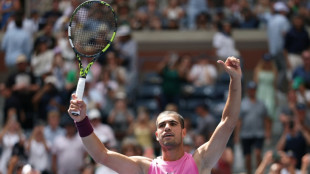
-
 Court battle underway as Fed Governor Cook contests firing by Trump
Court battle underway as Fed Governor Cook contests firing by Trump
-
Schwarber hits historic four homers but misses rare shot at five

-
 Injury doubt Tonali picked by Gattuso for Italy's World Cup qualifiers
Injury doubt Tonali picked by Gattuso for Italy's World Cup qualifiers
-
Spurs sign Dutch midfielder Simons in boost for new boss Frank

-
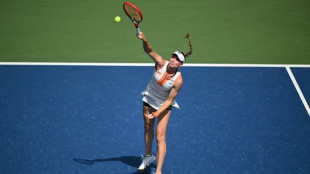 Rybakina routs Raducanu to advance at US Open
Rybakina routs Raducanu to advance at US Open
-
US banana giant Chiquita returns to Panama
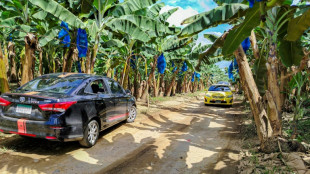
-
 Martin says Rangers remain supportive despite woeful start
Martin says Rangers remain supportive despite woeful start
-
Stocks slide as US inflation clouds rates outlook

-
 Smog then floods: Pakistani families 'can't catch a break'
Smog then floods: Pakistani families 'can't catch a break'
-
US to refuse visas to Palestinian officials at UN summit on state

-
 Ayuso triumphs in Vuelta stage seven, Traen keeps red jersey
Ayuso triumphs in Vuelta stage seven, Traen keeps red jersey
-
Goalkeepers still posing problems for Man City boss Guardiola

-
 Turkey bars Israeli ships, flights from its territory
Turkey bars Israeli ships, flights from its territory
-
Forest boss Nuno plans Marinakis talks after transfer issues

-
 Putin will have 'played' Trump if he refuses to meet Zelensky: Macron
Putin will have 'played' Trump if he refuses to meet Zelensky: Macron
-
Norris sets early pace at Dutch Grand Prix practice

-
 Bargell tackles medical challenge and starts for US at Women's Rugby World Cup
Bargell tackles medical challenge and starts for US at Women's Rugby World Cup
-
Vardy in talks to sign for Serie A outfit Cremonese: source

-
 Trump withdraws Kamala Harris's Secret Service protection
Trump withdraws Kamala Harris's Secret Service protection
-
Arteta concerned by Saka injuries after latest hamstring blow

-
 Red Cross says number of missing people surging
Red Cross says number of missing people surging
-
Tuchel apologised to Bellingham over 'repulsive' blast

-
 Garnacho arrives at Chelsea as £40 m move from Man Utd moves closer
Garnacho arrives at Chelsea as £40 m move from Man Utd moves closer
-
Iran has executed at least 841 people this year: UN

-
 'Sometimes I want to quit' says troubled Man Utd boss Amorim
'Sometimes I want to quit' says troubled Man Utd boss Amorim
-
German neo-Nazi heads for women's jail after gender change

-
 Crystal Palace to face Dynamo Kyiv, Strasbourg in Conference League
Crystal Palace to face Dynamo Kyiv, Strasbourg in Conference League
-
Japan pledges $68 billion investment in India

-
 Europa League draw throws up Forest rematch with Malmo
Europa League draw throws up Forest rematch with Malmo
-
Rooney reckons 'something is broken' at Amorim's Man Utd


Eco-friendly mud houses make comeback in Hungary
They were long derided as old-fashioned symbols of grinding poverty, but mud and straw houses are making a comeback in Hungary as a low-cost, eco-friendly alternative to concrete.
Master builder Janos Gaspar, who renovates earth houses, is worked off his feet.
"I'm booked up for three years. Interest is sky-high," the 48-year-old -- who has built more than 200 clay houses -- told AFP.
Known as rammed earth construction, the practice dates to Neolithic times.
And it is seeing a revival thanks to its tiny ecological footprint and energy efficiency.
Locally accessible materials is the basis of what Gaspar's architect colleague Adam Bihari calls "natural architecture".
"Hungarians knew how to build houses from what they had to hand or under their feet," said the bespectacled Bihari as a clay brick wall was plastered with mud in the town of Acs in northwest Hungary.
"This wall was made 100 years ago, and should be around for another 100," said Bihari.
- 'Material of future' -
In contrast to concrete, which accounts for about eight percent of global CO2 emissions, "it eventually disintegrates naturally, leaving no artificial waste behind," he said.
With Gaspar, Bihari teaches his methods to scores of trainees every year. In the yard beside piles of sandy earth and straw, a dozen watched Gaspar demonstrate how to make mud bricks.
"This type of soil is perfect, and it's found everywhere around Hungary," said Gaspar as a cement mixer churned the ingredients into a mulch.
"You can make one brick a minute, and around 20,000 will make a house," he told the group while kneading handfuls of the mixture into a wooden mould.
The centuries-old practice fell out of fashion during the country's four-decade-long communist era.
"Folk traditions were officially frowned upon and modern materials took over," said Bihari, 33.
Clay brick walls were often cemented over which caused rot as dampness got trapped, he added.
More than one in seven Hungarians still live in earth-built homes, mostly in villages in poorer regions.
Bihari said it is hard to counter long-held associations with damp and poverty.
But interest in natural materials is increasing among developers and investors, according to the architect.
"It is the building material of the future," he said.
- 'Naturally smart' -
Bihari said clay's thermal properties make it ideal for Hungary's fluctuating climate of hot summers and cold winters.
One of the camp participants, Timea Kiss, who already owns a clay house but wants to learn how to renovate it, said her building is naturally warm in winter and cool in summer.
"Amazed visitors ask us where the air conditioning is, but there is none," said the 42-year-old.
Earth homes also regulate their own humidity, said Bihari, which can help people with asthmatic problems. They are also fireproof and non-toxic.
"You hear about 'smart' houses and even smart bricks," said Bihari. "But for me that is nonsense... clay is naturally smart."
Rising energy costs is another push factor behind the growing popularity of earth houses.
Several of the trainees in Acs told AFP they can no longer afford to build or buy conventional houses.
"My wife and I are interested in cheaper solutions like this, it's a bonus that it's good for the environment," said truck driver Zsolt Cserepkei, 31.
G.Schulte--BTB




